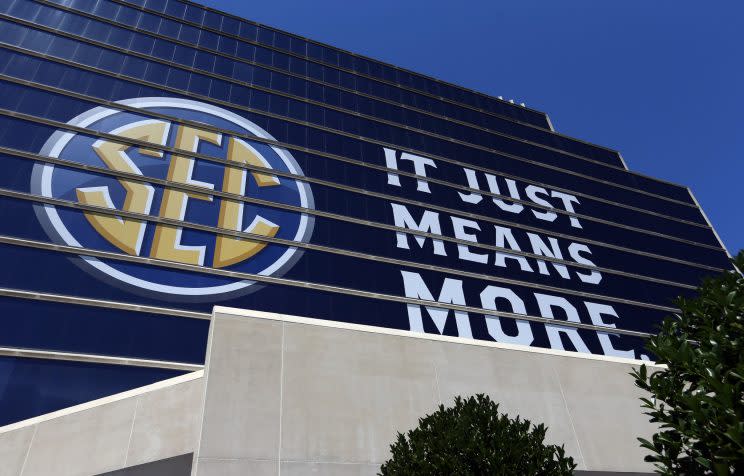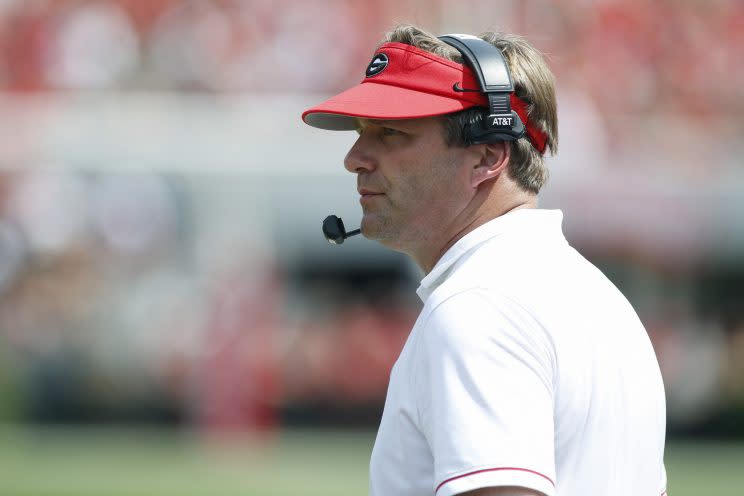Can one of these three underachieving SEC East schools bring balance to the conference?
HOOVER, Ala. – This being the Southeastern Conference, where aggrandizement is as endemic to the culture as sweet tea, they covered the Hyatt Regency’s 14-story front this week with the league’s operative slogan:
“It Just Means More.”
If It Just Means More of the same from the SEC East this 2017 football season, that’s not a good thing.
No sloganeering can disguise the fact that the league’s lesser division is not upholding its end of the competitive bargain with the West. The East champion has lost eight straight SEC championship games, by an average margin of 24 points. Florida, Georgia, Missouri, South Carolina – they’ve taken turns being steamrolled by the powers from the West. (Usually Alabama.)
That chronic imbalance damages the SEC’s long-held claim to being the best, deepest and most competitive conference in the country. League title games are almost uniformly bad ideas, but they’ve become showplace events. If your showplace event is an annual dud, it diminishes the overall product.
This has spurred periodic calls to change the divisional alignment, with the popular suggestion to move Auburn to the East and Missouri to the West. It certainly makes sense geographically, but college sports flunked geography years ago when realignment tore up the map. Commissioner Greg Sankey was asked Monday at SEC media days whether divisional realignment was on the table, and he quickly swatted away the premise.
“It’s not been an agenda item,” Sankey said.

In truth, realignment is unnecessary. These things are cyclical – in fact, the East won six straight SEC titles in the 1990s, and there were calls to realign then because the West was weak. The pendulum should swing back the other way eventually, simply because Nick Saban can’t coach forever.
While waiting for Saban to cease his reign of terror, here’s what the East needs: for its three best programs to quit underachieving and get back to power status.
Looking at you, Florida, Georgia and Tennessee.
Those three have combined to win 22 of 25 East Division titles. They’ve all won national titles. They have huge fan bases, big budgets and access to elite talent.
And yet they’ve somehow managed to simultaneously underperform. No disrespect to Missouri and South Carolina, but they don’t win the East three times between 2010-14 if the top programs in the division are doing their jobs.
A brief examination of the Underachieving Three – where the problems lie and when they might be back in the championship rotation:
Georgia has gone 36-16 the last four seasons, but just 20-12 in SEC play. The school got tired of Mark Richt and fired him after the 2015 season, moved to action in part because Saban assistant Kirby Smart was in line to get the South Carolina job and Georgia did not want to pass on a Bulldog alumnus it had coveted.
Smart’s first season was a succession of disappointments, with a blowout loss to a bad Mississippi team, a Hail Mary loss to Tennessee, a home loss to Vanderbilt, a third successive loss to rival Florida and an upset loss to rival Georgia Tech. Perhaps even worse was a narrow escape as a 53-point favorite over FCS Nicholls – the first warning sign that 2016 wasn’t going to be pretty.
The bitter taste from that 8-5 season helped spur both of Georgia’s star running backs, Nick Chubb and Sony Michel, to return to school for their senior seasons instead of going pro.
“We don’t want to leave that legacy behind – lose to Florida, lose to Tennessee, lose to Tech,” Michel said. “The expectations are high.”
On paper, Georgia has a team capable of meeting high expectations.
In addition to Chubb and Michel, having more experience at the quarterback and head-coaching positions should lead to great improvement. Jacob Eason was a hugely touted recruit who enrolled early, secured the starting job – and then struggled for most of the season, finishing 11th in the league in pass efficiency. Like Eason, Smart might have had more to learn than he realized in his first season as the man in charge. The growth curve for both could well be dramatic.
Georgia also returns 10 defensive starters. Find a few offensive linemen, a go-to receiver and win a key early season game at Notre Dame, and the Bulldogs could have their best season since going 12-2 in 2012.
But while Georgia looks like the favorite in the East, it would be a mistake to overlook Florida. Jim McElwain certainly agrees.
“Will somebody at least say we exist?” he asked Tuesday. “That would be nice.”

McElwain has actually done a good job in Gainesville – he’s won the East the past two seasons despite lousy luck at quarterback, losing his 2015 starter (Will Grier) to a positive test for performance-enhancing drugs and his 2016 starter (Luke Del Rio) to injury. He just hasn’t done a Steve Spurrier/Urban Meyer-level job yet.
This year McElwain should have his best quarterback play so far – he has Notre Dame graduate transfer Malik Zaire, Del Rio returns and redshirt freshman Feleipe Franks is highly regarded. The Gators need improvement at that position after failing to score more than 20 points in their past five regular-season games and averaging just 15 per game in that stretch.
Florida’s passing game has been underwhelming ever since Tim Tebow left campus, which is hard to excuse in a state that produces so many quality quarterbacks. After years of relying on defense, the equation is likely to shift after losing several stars from that side of the ball to the NFL.
“Our strengths are going to be in some different areas that maybe hasn’t been a strength since we’ve been here,” McElwain said.
Florida also plays just three true road games (Kentucky, Missouri and South Carolina) with two at neutral sites (Michigan in Texas and the annual Georgia game in Jacksonville). They have only one true road game before November. So the schedule tilts in the Gators’ favor.
And then there is Tennessee, which flopped in the favorite’s role last year. The Volunteers were a lucky 5-0 before it caught up with them, losing to Texas A&M, Alabama, South Carolina and Vanderbilt and finishing 9-4. Still, coach Butch Jones made an unconvincing attempt at spinning the season Monday.
“I don’t view it as a disappointment,” Jones said. “The way I view it is we didn’t accomplish everything we set ourselves out to. And, again, our goal every year is to win a championship and compete to win a championship.
“So, was it a disappointment? No. Did we not accomplish some of the things we set out to do? Absolutely. … But I think all you have to do is look at it’s difficult to win and it’s difficult to win championships.”
Actually, it’s not terribly difficult to win the SEC East. Even Missouri and South Carolina have done it in recent years. Until one or more of the Underachieving Three gets its act back together, that division will continue to be cannon fodder for the SEC West.

